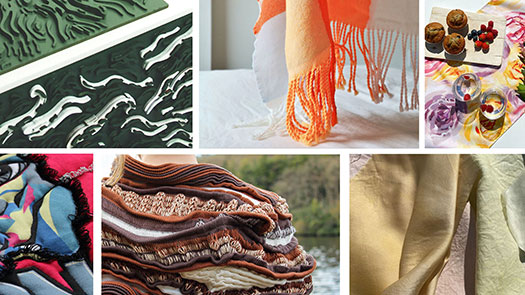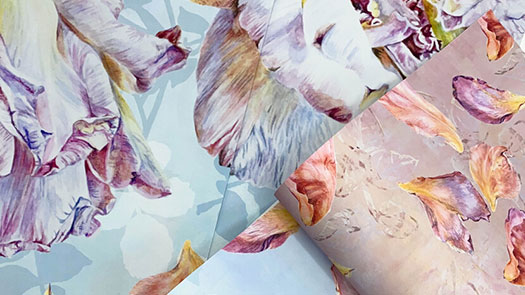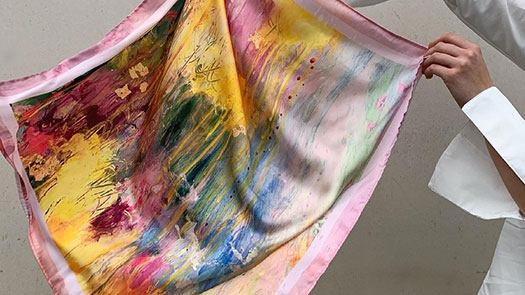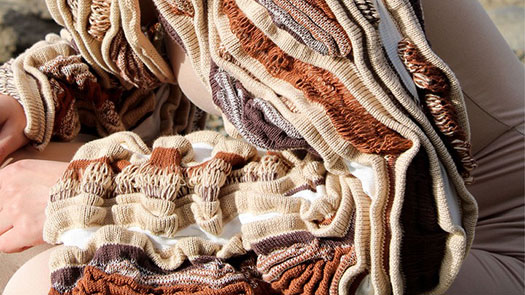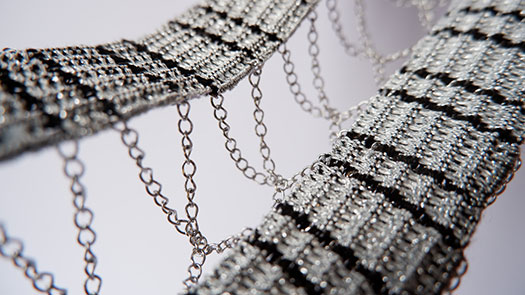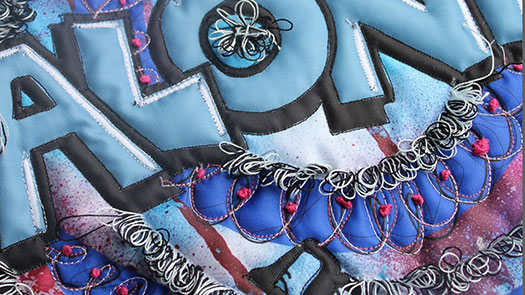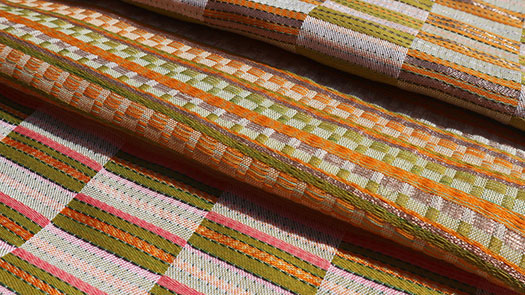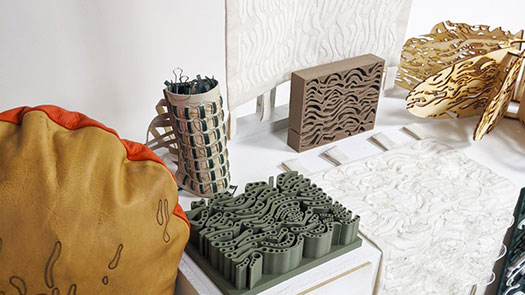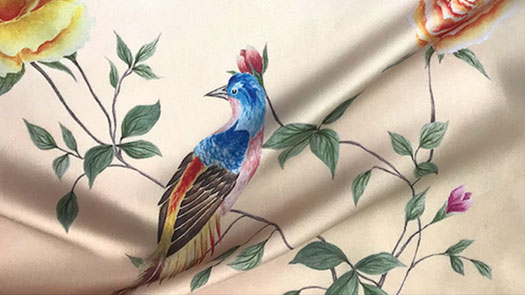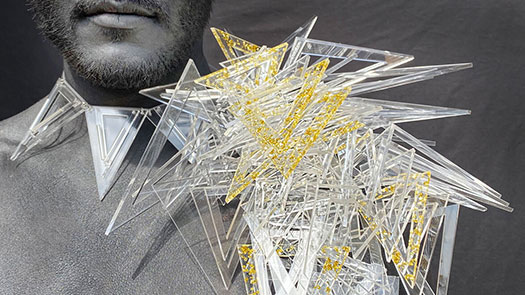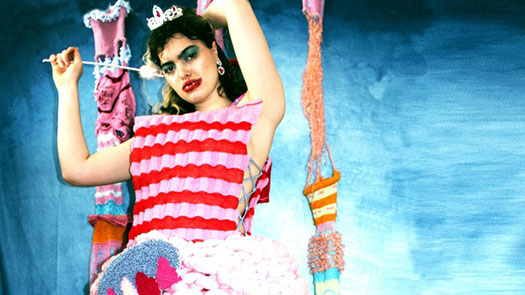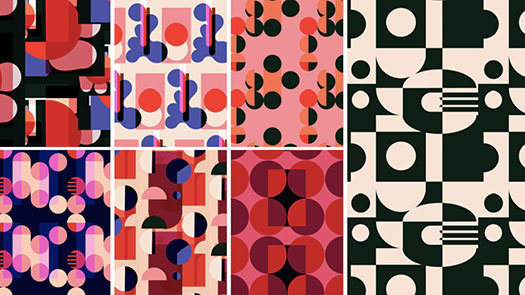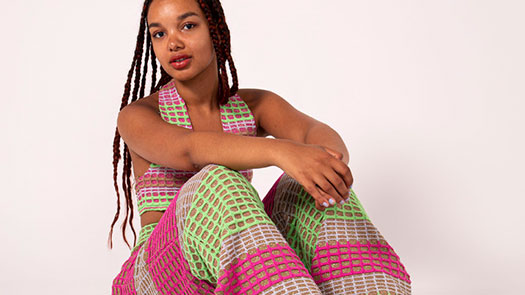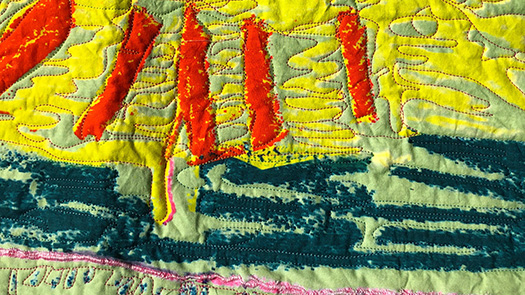Textiles
Textiles
4 years (with placement year and/or overseas study)
For September 2025 entry details see BA (Hons) Textiles in Practice.
The world of textiles is constantly evolving and you can be part of that, reshaping both the design process and our conceptual understanding of the field. As a BA (Hons) Textiles student, you’ll have the opportunity to explore the expansive realm of textile design, fostering innovation and creativity. We celebrate the rich heritage of textiles whilst highlighting future technological advancements and sustainable material practices, all with the aim of pushing the boundaries of textile innovation.
You’ll begin with hands-on inductions into a variety of specialist workshops, providing you with a solid foundation in textile fundamentals on which to build as you progress through your journey with us. Throughout the course, you’ll be guided by expert academic and technical staff, many of whom are active researchers or practicing textile designers.
We’ll support you to become a creative problem-solver and human-centred designer, ensuring you’re equipped to tackle the challenges of both the local and global textile industries. Innovation is encouraged through material experimentation and testing, in response to real-world scenarios and industry briefs across sectors such as architecture, automotive, apparel, and CMF (Colour, Material, and Finish). We also emphasise personal growth, encouraging you to develop your individual interests and ambitions, whilst reflecting the diverse and versatile possibilities of textile design in contemporary contexts
Special Features
- Globally recognised: We are ranked in the top 100 schools for art and design in the world (QS World Rankings 2025).
- Specialisation options: You can focus on your areas of interest through project options, giving you the opportunity to focus on print, weave, knit, embroidery and mixed media.
- Creative facilities: You'll have access to our extensive range of workshops, encompassing both traditional and digital creative methods, with support from expert technicians.
- Academic excellence: Our teaching staff are practising textile practitioners and researchers who bring their knowledge and expertise to the course.
- Collaboration: You will take part in an innovative module offered to students across Manchester School of Art which encourages interdisciplinary study, collaboration and external-facing projects.
- *Scholarships available: This course has a scholarship available for 2025 entry. The Bernard and Frieda Clowes Textiles Scholarship offers an £18,000 cash bursary, to support students who have a household income of £25,000 or less. Find out more.
Course Content
You will be taught through core pathways, offering you the opportunity to specialise or combine disciplines such as print, weave, knit, embroidery, and mixed media. Emphasis will be placed on developing your personal interests and ambitions, reflecting the breadth, versatility, and potential of textiles within contemporary art and design.
Through live project briefs and work placement opportunities, you will have the chance to develop these skills collaboratively, working with external clients.
At Manchester School of Art, our design courses are taught in vibrant, open studio spaces alive with energy and creativity. These dynamic environments foster cross-disciplinary collaboration, encouraging students to engage, experiment, and learn from one another within a culture of shared practice and innovation.
Year 1
In Year 1 you will develop a broad understanding of textile contexts and the visual research, technical tools and skills the programme requires. You will be introduced to creative attitudes to learning, working and thinking.
Future X: Kinship
In this module, you will explore your creative field through questions of belonging, encouraging you to consider relationships with the planet, people and place. The module functions as a Speculative Laboratory where we embrace More-Than-Human perspectives and develop new disciplinary connections to create innovative and regenerative ways of living and interacting with the world. This is an opportunity to begin to explore how creativity can be a catalyst for meaningful change.
Year 2
In Year 2 you will be able to determine your specialist pathway through the programme and develop the skills to articulate your ideas. There will be opportunities to engage with external partners (including studios, manufacturers, galleries, external projects) and collaborate with students and staff from across the faculty.
Tacit Trajectories
This module encourages students to become responsible, human-centred designers by engaging in outward-facing opportunities. Students will explore the tacit and haptic qualities of both physical and digital textiles, deepening their understanding of textile practices. They will also examine sustainable design choices and learn how to enhance the value of materials through design intelligence.
Year 3
In Year 3 you will create a portfolio of work that showcases your practice, developing a deep understanding of the context of your work, and creating products and artefacts that reflect your specialism.
Future X: Re-worlding
In this module, you will explore the boundaries of where your discipline intersects with other fields of practice as a catalyst for innovation. You will use theory to contextualise thinking, moving beyond the silo of subject specialism, and engage in imaginative experiments to rethink traditional approaches and roles in 'the profession’. This module helps prepare you for your final year of study, setting the context for the year ahead.
Placements
You will be supported and encouraged to take advantage of work-based learning opportunities, with established links across a wide range of creative and commercial organisations.
Assessment Weightings & Contact Hours
10 credits equates to 100 hours of study, which is a combination of lectures, seminars and practical sessions, and independent study. A three year degree qualification typically comprises 360 credits (120 credits per year). The exact composition of your study time and assessments for the course will vary according to your option choices and style of learning, but it could be—
Study
- Year 1 30% lectures, seminars or similar; 70% independent
- Year 2 30% lectures, seminars or similar; 70% independent
- Year 3 100% placement (optional)
- Year 4 25% lectures, seminars or similar; 75% independent
Assessment
- Year 1 100% coursework
- Year 2 100% coursework
- Year 3 100% placement (optional)
- Year 4 100% coursework
Student Work
Visit our online Degree Show galleries to view the work of students from the course (previously called Textiles in Practice).
Staff
- Mark Beecroft
Programme Leader
— - Clare Calveley
Senior Lecturer
— - Emma Cocchiarella
Senior Lecturer
— - Kate Egan
Senior Lecturer
— - Rowanna Lacey Ewings
Senior Lecturer
— - Sophia Fenlon
Senior Lecturer
—
Rising drag star, Viola, studied at Manchester School of Art
Our students and graduates dazzled at this two-week celebration of young design talent
Graduates
Past textile graduates hold key creative positions in organisations such as Habitat, Paul Smith, Aardman Animations and ASOS or are self-employed as designers and practicing as artists. Some are in postgraduate education at the Royal College of Art, London College of Fashion and at Manchester Metropolitan University. Many are teachers in schools and academics in universities and art schools in the UK and overseas.
Making an Application
How to Apply
Apply through UCAS.
You will be notified of our decision through UCAS.
Entry Requirements
| UCAS Tariff Points/Grades Required | 104-112. GCE A levels - grades BCC or equivalent. Pearson BTEC National Extended Diploma - grade DMM. Access to HE Diploma - Pass overall with a minimum 106 UCAS Tariff points. UAL Level 3 Extended Diploma - grade of Merit overall. OCR Cambridge Technical Extended Diploma - grade DMM. T level - We welcome applications from students undertaking T level qualifications. Eligible applicants will be asked to achieve a minimum overall grade of Merit as a condition of offer. IB Diploma - Pass overall with a minimum overall score of 26 or minimum 104 UCAS Tariff points from three Higher Level subjects. Other Level 3 qualifications equivalent to GCE A level are also considered. A maximum of three A level-equivalent qualifications will be accepted towards meeting the UCAS tariff requirement. AS levels, or qualifications equivalent to AS level, are not accepted. The Extended Project qualification (EPQ) may be accepted towards entry, in conjunction with two A-level equivalent qualifications. International students will be required to achieve an IELTS score of 6.0 with no component less than 5.5, or an equivalent accepted English language qualification. |
|---|---|
| Specific GCSE Requirements | GCSE grade C/4 in English Language or equivalent, e.g. Pass in Level 2 Functional Skills English |
| International Baccalaureate | Pass overall with a minimum overall score of 26 or minimum 104 UCAS Tariff points from three Higher Level subjects Points |
International Students
A minimum IELTS score of IELTS score of 6.0 with no component less than 5.5, or an equivalent accepted English language qualification. is required.
There’s further information for international students on our international website if you’re applying with non-UK qualifications.
Tuition Fees 2026 Entry
UK and Channel Island students
Full-time fee: £9,790 for the 2026/27 academic year*. £10,050 for the 2027/28 academic year*. Fees for subsequent academic years may increase for inflation to reflect increased costs of course delivery (up to a maximum of 10% per academic year) and/or changes in UK government regulation. Inflationary increases will be calculated by reference to RPIx (RPIx is a measure of inflation in the UK). Fee increases are subject to limits imposed by UK government regulation.
Find out about the extra support we may be able to provide with our scholarships for UK students.
EU and non-EU international students
Full-time fee: £21,500 per year. Tuition fees will remain the same for each year of your course, providing you complete it in the normal timeframe (eg no repeat years or breaks in study).
Many of our international students are eligible for a discount on their tuition fees. Visit our scholarships and funding pages to find out what's available for you.
Additional information
A degree typically comprises 360 credits, a DipHE 240 credits, a CertHE 120 credits, and an integrated masters 480 credits. For courses that offer a placement year option the tuition fee for the placement year in 2027/28 is £2,010*. For courses that offer a study year abroad option the tuition fee for the study year abroad in 2027/28 is £1,505*. Placement year fees and study abroad fees for subsequent academic years may increase for inflation to reflect increased costs of course delivery (up to a maximum of 10% each academic year) and/or changes in UK government regulation. Inflationary increases will be calculated by reference to RPIx (RPIx is a measure of inflation in the UK). Fee increases are subject to limits imposed by UK government regulation.
* Subject to Parliamentary approval.
See Funding your studies for further information and advice.
Additional Costs
Specialist Costs
Optional £100* —A ‘studio toolkit’ of basic design equipment including items such as pens, sketch pads, erasers, scissors and adhesives. Costs ranging from £30 - £100 per year.
Professional Costs
Student membership fees are available across all disciplines. You will be made aware of these however, they are not mandatory.
Other Costs
Study trips
Optional national and/or international study trips, typically during year one and two. These are mostly funded by students.
Costings are sourced from university-approved agents and will vary in-line with the current market and student numbers.
Laptop
Indicative cost PC Laptop: £600 -£1,000 (dependent on screen size) Indicative cost MacBook Pro: £1,500 - £2,200 (dependent on screen size)
Loan laptops and iMac/PC workstations are also available across the campus.
Workshop and Materials
Materials are provided for workshop inductions, further materials used when developing individual student work are available for purchase at cost from workshop stores. Costs are dependent on the specifics of student project ambitions.
Print Costs
You may be required to print work for assessment presentations through years one - three. A range of printing outcomes can be achieved at low cost using Man Met / School of Art printing facilities.
In year three, there could be an approximate additional amount of £100, towards printing cost for the degree show exhibition.
Indicative print / binding costs for the degree show – £100- £200 depending on individual projects.
* All amounts shown are estimates.
